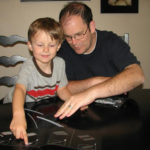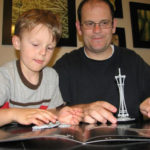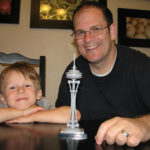I noticed today that Google Docs changed their icon on one of their buttons. Clicking this particular button will select the formatting for the current element; you can then click on another element and apply to it the formatting from the first element. Icon designers have long made metaphors between abstract actions and concrete actions, using images from the latter to represent the former. The metaphor for this action has long been painting — applying the formatting feels a bit like you are painting the new element with your mouse — and the icon to represent this action has long has been a paintbrush.
Here are pictures of the two icons:
 Old Icon
Old Icon
 New Icon
New Icon
It struck me that I must no longer consciously think of the metaphor when I use the action; I now just think “paintbrush equals copy formatting.” The new icon sticks with the same metaphor, but I found it a bit jarring because it is now a paint roller instead of a paintbrush. When I didn’t find the paintbrush, only then did I think back to the metaphor and figure out that the paint roller must perform the same abstract action as the paintbrush did.

We celebrated Talk Like A Pirate Day with a pirate-themed party, complete with costumes and kids’ activities. For dessert, we made this treasure map out of cupcakes and candy.
I reviewed a book of poetry, The Throne of Psyche by Marly Youmans, for the latest issue of Mythprint. The title poem contained a retelling of the Greek myth of Eros and Psyche, and I was asked to review it because of my interest in myths. I discussed the title poem in some detail in my review, but a couple other poems really struck me (including the one I discussed last week called “The Exile’s Track“). In “Near The End Of The World,” we see artists toiling away to preserve an ancient musical tradtion — even though the world no longer appreciates the beauty of their music. Even though these singers seemed “silly” to outsiders, I suspect they found a satisfying sense of purpose in their work. This image of the final singer — I imagine a man sitting in a chair on the beach, facing the ocean, toiling as the sun sets before him — will stick with me as I continue to wrestle with how to spend my time and energy.
The poem was originally published in Unsplendid. You can read it or listen to Youmans read the poem on YouTube on Unsplendid. I have included the full text of the poem below:
Once wrestled into place, the stones were walls
Of coastal towers where the resolute
Lit lamps and labored in the ancient way.
These were the ones afflicted by the word,
Who toiled in joy or dole because to make
The sweet sounds sing together was a gift
That couldn’t be renounced. And when the world
In turning turned away the magic sea
—Its depth, electrogenic light, and dreams—
Turning instead to shallower waters,
Mechanical romances, pixel-quests,
Most any product stuttering-fast and bright,
The singers did not yield and often said
So long as there was one for whom the word
Could conjure vision, they would not cease work.
In time a singer proved the only one
—The oceanic last—but did not stop.
How silly they look now—who gave their best
To live as none would any longer live,
Like bubbling fountains in a wilderness.
I reviewed a book of poetry, The Throne of Psyche by Marly Youmans, for the latest issue of Mythprint. The title poem contained a retelling of the Greek myth of Eros and Psyche, and I was asked to review it because of my interest in myths. I discussed the title poem in some detail in my review, but a couple other poems really struck me. In “The Exile’s Track,” the narrator perceives a wonder of nature that impresses upon her a narrative about its history and her relation to it. This poem seems to me to reflect the way I imagine many of the great myths coming into being — not as conscious explanations for natural phenomena, but more as intuitive insights that arise subconsciously in response to them.
The poem was originally published in storySouth, and you can listen to Youmans read the poem on YouTube. I have included the full text of the poem below.
At midnight I went down to the lake, and there
I saw the northern lights as seven swords
Of long-dead kings that glimmered in the sky.
They were as thin and cold as icicles,
Set evenly above a shoal of cloud—
The winter’s glittering eyes drew low to see,
Its glories made into one burning look.
I stepped onto the marble arrowhead
That points the way to North forevermore,
And though I stood below a canopy
Close-crowded with the bright burrs of the stars,
And though I held my love, and though our children
Were safe and sleeping at my back, I met
And knew a loneliness beyond all heal.
A silvery voice arose out of the spires,
Out of the dark’s offhanded elegance:
You gave your heart away, oh, long ago,
So there’s no help–now you must bide in frost,
And when you die, the reaper’s men will scar
The ground for your grave, or else will burn your limbs
And bury the ash in a wall of stone.
I have had many conversations about what exactly “myth” is over the last few years. I believe now that whether or not a particular story counts as “myth” is relative to a given person; a given story could be a “myth” to one person and not to another person. My ideas on this are not all worked out yet, but I think that the primary determining factor is the role that a story plays in the life of the person or the community. I had an experience over the weekend that reminded of this.
We visited the summer camp where my wife and I met last weekend. I had a fun time playing with my four-year-old son on a treehouse playground. He was feeling adventurous but also nervous as he approached the swinging rope bridge. I held his hand and encouraged him as he inched along. He started to chant something like a mantra to himself: “I think I can, I think I can, I think I can.” This chant gave him the courage to finish crossing the bridge. (Here’s a photo of us on a later trip across the bridge, when he was more comfortable.)
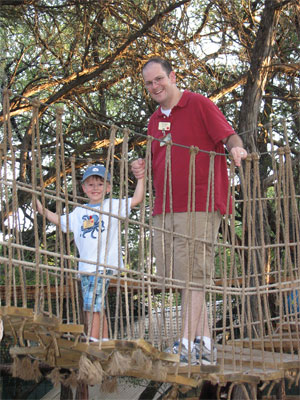
You probably recognize this chant from “The Little Engine That Could.” I don’t know anyone who would consider that story a “myth”; I imagine “fable” is the highest status any literary scholars would be willing to grant it. But for my son that day, this story was so much more than just a fable; the little engine was so much more than just a positive example. This story had gotten under his skin and made its way to the core of his being. In a difficult circumstance, he tapped into the power of narrative to bring about a psychological transformation. For me, the story is a childish, uninspiring fable; but for my son, this story played the role of myth in his life.
I recently discovered a great short story online called “The Silver Key” written by H.P. Lovecraft in 1926. It tells the story of a young man who loses his sense of child-like wonder at the world. One passage near the beginning caught my attention. The narrator, who had not lost his sense of wonder, describes the man’s situation:
Randolph Carter […] had forgotten that all life is only a set of pictures in the brain, among which there is no difference betwixt those born of real things and those born of inward dreamings, and no cause to value the one above the other. […] He failed to recall […] that the deeds of reality are just as inane and childish [even though] their actors persist in fancying them full of meaning and purpose as the blind cosmos grinds aimlessly on.
I encountered similar ideas through other means, and I wrote a short essay about that titled “Imaginary Worlds” last month. These observations can be an compelling first step to moving from a “modern”, scientific, materialist view to a “post-modern”, subjective, spiritual view.
Beyond these opening remarks, “The Silver Key” is a wonderful story of magic and mystery with important comments on “modernism”.
Read “The Silver Key” →
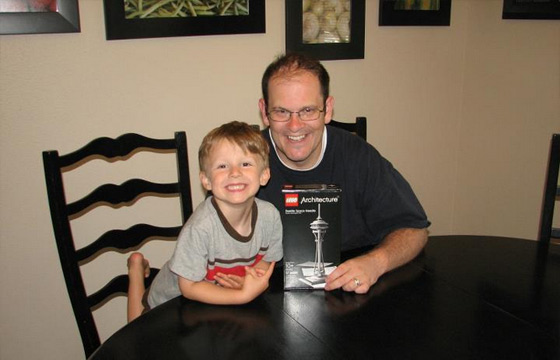
I love Seattle, and I love LEGOs. So the LEGO Space Needle that my wife and son got me was a perfect birthday gift. My son and I had a great time building it over the weekend. (He’s gotten quite good at building with LEGOs and following instructions, and I love that he sticks his tongue out when he focuses.)
I reviewed the new Fantasy Magazine for Mythprint back in June, and the review is now online. There was some great content (some incredible stories and one good fact article) in the new editor’s first three issues, and I look forward to keeping up with the publication.

Leaving Portland International Airport (PDX) this afternoon, we had a great view of the peak of (I believe) Mount Hood above the clouds from the airplane.
![]() Old Icon
Old Icon![]() New Icon
New Icon


